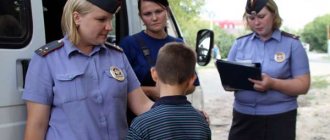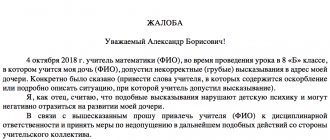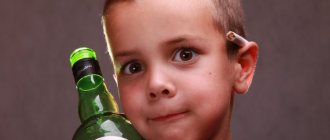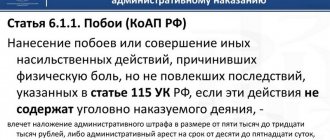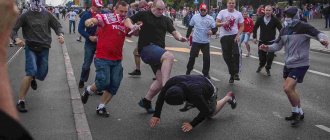Giving a slap in the face, putting him in a corner “on buckwheat” or giving him a belt are ancient methods of education that are widely used by parents to this day. Physical education measures in many families are considered something of a norm: “what’s wrong with this, they gave me a belt and everything is fine with me.”
At the same time, more and more often in the media, on television news, we see stories about unfortunate parents who maim or even kill their children using such methods of education.
The law in such cases is not clear, because according to the already adopted decriminalization, beatings in the family no longer faces criminal liability - such a person is brought to administrative responsibility:
“If the fact of physical impact on a child, which did not cause deterioration in health, is recorded again, and there are witnesses to this, the parents (or his official representatives) will be held administratively liable.”
In this case, the law provides for a fine of up to 30,000 rubles, administrative arrest for up to 30 days, or community service.
There is a somewhat ambiguous point in this interpretation of physical impact on a child: in the absence of deterioration in physical health. That is, if after a regular “belt on the butt” the child does not become disabled, the parents will not bear responsibility for this as such.
The consequences of even one blow for a child often cause the following:
- The child does not listen to his parents, but is afraid. Therefore, there is no understanding, fear of one’s own misdeeds begins, hiding information, lying, so that adults do not find out and punish.
- The child becomes withdrawn, aggressive, and adopts the “any problem can be solved with fists” behavior model towards others.
Beating a child is not only a negative physical impact, but also a psychological trauma that can cause quite serious problems in adult life.
Reasons and motives: why do parents beat their children?
The most common thing you hear from such parents is: “I was raised this way as a child.” No matter how paradoxical it may sound, for many it is already a kind of family tradition to pass on such methods of raising a child by inheritance.
In fact, the reason is different: the mother or father is simply not competent enough in upbringing, they do not have the ability to normally come to an agreement with the child and solve the problem, and the use of force is something where a lot of intelligence is not needed - for that the child will immediately understand and do more will not be. But, in this case, the parent does not think about why it won’t happen (if so) - the child will not understand his offense, but will simply be afraid. And in this case we are not talking about education at all.
The use of physical violence against children of primary preschool and school age occurs much more often than against older children. This is due to the fact that at this age the child is unlikely to complain to any of the strangers and parents, naturally, nothing will happen for this. Bruises and abrasions can easily be attributed to the fact that the child fell himself, got into a fight, was injured while playing on the street, and so on.
Have a question for a lawyer? Ask now, call and get a free consultation from leading lawyers in your city. We will answer your questions quickly and try to help with your specific case.
Telephone in Moscow and the Moscow region: +7
Phone in St. Petersburg and Leningrad region: +7
Free hotline throughout Russia: 8 (800) 301-39-20
At school age, a child often already realizes that he has someone to ask for protection. In addition, adults can also pay attention to the presence of physical injuries: teachers, parents of other children, and classmates themselves can tell their parents or teachers about it.
Beating a child by his parents
Often, in response to allegations of harsh treatment of children, parents motivate their actions by the accepted method of education . And they refer to traditions accepted in the family, according to which disciplinary measures against the offender may imply physical punishment.
They consider torn hair, bruises and hematomas to be the norm. However, the law, which has become quite friendly to spanking on the street or at home, is still strict in relation to parents who regularly beat their children.
For beating a minor that causes physical pain but does not result in health problems, parents may face a fine or even restriction of freedom and mandatory community service. The fact of family relations is not significant here.
Battery is a blow inflicted intentionally that causes physical pain.
To prove the fact of beatings, a forensic expert can record:
- bruises (usually on soft tissues);
- bruises and bruises;
- superficial abrasions, wounds, hematomas.
In addition, other signs of violent acts may be considered evidence.
These may be marks from compression of limbs and other parts of the body, pinches, bite marks, torn hair. Important: violent actions against children also include tying up, restricting freedom in a cramped enclosed space, prolonged kneeling, especially on peas (there are also those who use such a barbaric method of punishment among supporters of “traditional methods of education”).
Differences between physical abuse and torture
Education using physical force cannot be considered beating. Disciplinary measures that involve striking for certain offenses are considered acceptable by some. Moreover, among the supporters of such methods there are even teachers and law enforcement officers.
It is believed that a child should clearly understand why this kind of punishment awaits him, and not live in constant fear that he will be hit, or even beaten.
The effectiveness of this method of education is highly questionable. If the law protects the physical integrity of citizens, then on what basis can it be violated in relation to the youngest Russians?
The usefulness of this method, which only convinces the child that the one who is stronger is right, also raises doubts. Paradox: a slap, a slap on the head, or a blow from a boss for a job done incorrectly will be perceived by any subordinate as, at best, an insult. But the same subordinate will consider it normal to hit his son for unfinished homework or a bad grade.
Supporters of physical punishment, no matter what family values they refer to, are simply unable to use other methods of education, and are not smart and educated enough to establish a relationship with a child without causing him pain .
The consequences of even one blow can be very disastrous.
- The child withdraws into himself and does everything to prevent his parents from finding out about his misdeeds.
- There is growing distrust in the world, the family, and the state, which is unable to protect.
- The pain inflicted on a child in a family, in a home where he considered himself safe, makes him realize his own defenselessness against brute force and begin to either learn to respond to aggression with aggression, or to lie, dodge, hide information for which he can be punished, in any way. including illegal methods.
Right to defense
A child of any age has the right to protection. The following may file a complaint with the police and the guardianship and trusteeship authority that unacceptable educational measures are being applied to a child:
- teachers: teachers in school and out-of-school educational institutions, educators in kindergartens;
- random witnesses;
- neighbours;
- social service workers.
Any citizen who has witnessed the beating of a child has every right to report this to the competent authorities.
How to prove and defend?
To bring charges, evidence will be required; one statement will not be enough.
Who can report?
Neighbors, relatives, and close people who become aware that a child is being beaten should not ignore this fact. Caregivers and teachers who notice signs of violence on a child’s body can also report beatings.
Where to contact?
If beatings are discovered, you should contact the police, the inspectorate or department for minors, guardianship authorities, the Ombudsman for Children's Rights, or the court.
It is enough to contact one authority so that a full investigation is carried out , both family members and immediate circle are interviewed. A statement is not always necessary; sometimes an anonymous call is enough.
Evidence
Even if the beatings did not leave marks on the body, torn clothes and damaged items can serve as material evidence of beatings and beatings of a child .
The lack of necessary clothing, food, household and hygiene supplies, toys, items for development and training can indicate improper performance of duties.
You can have the beatings removed at the forensic bureau , and if you had to go to a hospital for help, a doctor must issue a certificate of bodily injury.
Are witnesses needed?
If there are witnesses to a violation of the law, their testimony should definitely be recorded for the court. As a rule, those who saw a child being beaten, both children and adults, do not give up their testimony. After all, everyone understands that otherwise there will simply be no one to protect the baby.
Is it possible to prove without witnesses?
The marks left on the body will in themselves be evidence of ill-treatment. In addition, psychological testing, medical diagnostics, and the child’s own story will help confirm the fact of harm to the child.
What to do if the police don't help?
Unfortunately, police officers often choose to remain inactive until a more serious crime is committed.
If the application is refused to be accepted or nothing is done about it, you should contact the guardianship authorities , social workers at the school or education department, the ombudsman for children's rights or the guardianship authorities. It is effective to appeal to representatives of the public and the deputy corps.
What is the penalty for beating?
If the fact of assault, but without damage to the child’s health, is recorded for the first time, then it is likely that the parents will get off with just a preventive conversation. A repeated crime of this nature, and especially with witnesses, already threatens with administrative liability:
- a fine of up to 30,000 rubles;
- public Works;
- administrative arrest.
If the beatings are systematic and leave marks on the child’s body, then we need to talk about a criminal offense.
In addition to all this, the guardianship and trusteeship authorities are also involved in the work: such a family must be registered and monitor everything that happens there. It is likely that things may come to the deprivation of parental rights or the removal of children from the family for a while - until the parents are re-educated.
Legislative framework: on a criminal offense
Thus, beating a child by a parent can be considered a criminal offense under the following articles:
- Article 112 of the Criminal Code of the Russian Federation - up to 5 years of imprisonment if the beatings were inflicted on a minor or minor child;
- Article 116 of the Criminal Code of the Russian Federation – battery with grievous bodily harm;
- Article 117 of the Criminal Code of the Russian Federation – systematic beating of a child.
Serious bodily harm to a child can lead to 10 years in prison. And the fact that such measures are being taken by the parent only aggravates the latter’s situation.
In addition to the fact that a parent can be prosecuted for battery, an additional punishment will also be imposed under the article for cruelty to children (Article 156 of the Criminal Code of the Russian Federation).
Responsibility measures
Due to the age limitation of the articles of the Criminal Code, under which a person or group of persons can be held accountable for beating a minor, the penalties applied are assigned from the same ranges, but for persons under eighteen years of age, the degree of punishment imposed is milder than for adults, despite using the same limits.
If we are talking about the application of the provisions of Article 116 of the Criminal Code of the Russian Federation to determine punishment, then there is no distinction in it as to who committed the crime and against whom , that is, for all persons who committed beatings, the same types of punishments are used , namely:
- compulsory labor with a maximum sentence of up to three hundred and sixty hours;
- correctional labor with a maximum duration of punishment of up to one year;
- restriction of freedom with a maximum limit of two years;
- forced labor for a maximum period of no more than two years;
- arrest with a term of imprisonment of up to six months;
- imprisonment for up to two years.
If we are talking about causing serious harm to the health of a minor, then the punishment is established in accordance with the provisions of Part 2 of Article 111 of the Criminal Code of the Russian Federation within the limits of:
- imprisonment with a maximum sentence of ten years in prison;
- with the possibility of imposing an additional punishment in the form of restriction of freedom for up to two years (appointed as an additional punishment at the discretion of the court).
If the harm caused to the health of a minor is assessed as harm of moderate severity, then such a crime is punishable by imprisonment with a maximum term of imprisonment of no more than five years.
Where to contact?
If you witness a child being beaten, especially if they do it systematically, you should immediately contact:
- territorial police department;
- juvenile affairs inspectorate;
- social service;
- guardianship and trusteeship authority.
Quite often, in addition to beatings, there are other negative impacts on the child in the family: moral, material, and even sexual. Beating of children by parents often occurs against the background of the latter’s antisocial lifestyle: drunkenness, drug use, vagrancy and fraud. Therefore, such actions cannot be ignored. Parents who engage in assault need to realize the following: a child is not a thing or property and, regardless of his age, he must be treated with respect.
Features and nuances
Any case of domestic violence is unique; it is impossible to judge the situation as a whole based on one fact that has become known. Some nuances also become important. For example, this is beating a minor of his peer.
Beaten by father
The child takes punishment from the father for granted, but what is worse is that the mother, the other person in her family, considers violence to be the norm and does not consider it necessary or is simply afraid to report the beatings. In this case, the testimony of witnesses and teachers, whose responsibilities also include protecting the child, is valuable.
Babysitter beating
It is not always possible to immediately notice the fact of beating, or even systematic beating of a child by a nanny. The baby will be afraid to say where he got the bruises; the nanny herself may intimidate him, saying that the parents will punish him in the same way for what he did.
Important! Parents are obliged to be vigilant, pay close attention to the appearance of wounds and bruises on the child’s body, and thoroughly find out where they came from. Rough treatment of a small child is simply unacceptable.
Corpus delicti
Depending on the degree of beating and the severity of health damage, the crime will be classified differently. Thus, the article of the Criminal Code of the Russian Federation for beating a minor child, which is used to impose punishment, can vary significantly.
According to legal theory, the corpus delicti consists of:
- The subject of the crime is the person who committed the crime, as well as his special characteristics (position or position due to which the victim becomes dependent on him).
- The object of the crime is not only the personality of the victim, but also the social relations that the criminal encroaches on.
- The objective side is the action/inaction, the connection between them and the consequence, as well as the weapon and method of committing the crime.
- The subjective side includes signs of guilt (intention/negligence), the purpose and motive of the crime, as well as the emotional state of the criminal.
The subject of a crime is considered to be a mentally healthy, sane person who has reached the age of 16 (if a crime is charged under Articles 111-112 of the Criminal Code of Russia - grievous bodily harm, then liability begins at the age of 14).
That is, you do not have to be an adult to receive the proper sentence. All crimes related to battery are classified as crimes against life and health, therefore, in this case, regardless of the classification of the crime under a specific article, the object is health.
The objective side is unlawful infliction of harm to health. Harm may involve disruption of the integrity of organs or their physiological functions. The severity of the harm is determined by an expert examination. Signs of violations are listed in the articles of the Criminal Code, which makes it possible to divide them by severity.
The subjective side is characterized by intent. In other words, the person understood that certain consequences would occur as a result of his actions and desired them to occur. We are talking about unspecified intent, since in most cases the offender has no idea what kind of damage may occur as a result of the beating. That is, he does not understand how much he needs to hit to cause a certain amount of damage . The goals and motive of the attacker matter in aggravating the responsibility. All this is clarified during the investigation.
Causing harm by negligence is a separate article of the Criminal Code and has nothing to do with beating.
Who is responsible for a fight at school or kindergarten?
When a student appears on the territory of an educational school, the school management, as well as the classroom teacher, take responsibility for the child. During lessons, the teacher of the current subject is responsible.
The relevant Law “On Education” obliges teachers to protect their students from violence, mainly psychological.
If there is a fight between students at school, the direct blame will lie solely with the quarreling children and their parents . A teacher can only be accused of inaction if he saw the conflict and did not take any action. Simply put, the teacher must prevent a possible fight between his students. If the conflict began in front of the teacher, this is a poor performance of his duties, entailing disciplinary action .
All school conflicts are within the competence of the deputy director for educational work. It is this person who determines all the circumstances of the emergency and calls the parents for further proceedings.
What is the punishment for beating a child by a minor?
Regardless of where the fight between two children occurred, the offender and his parents will bear responsibility. You need to understand the amount of responsibility that falls on the child who started the fight.
The Criminal Code of Ukraine provides for liability for causing light, medium and severe injuries, as well as torture and beatings.
According to the law, teenagers 14 years of age will be held accountable before the law for causing moderate and severe bodily harm, in accordance with Part 2 of Art. 22 of the Criminal Code. And only from the age of 16 for causing harm in the form of minor injuries.

